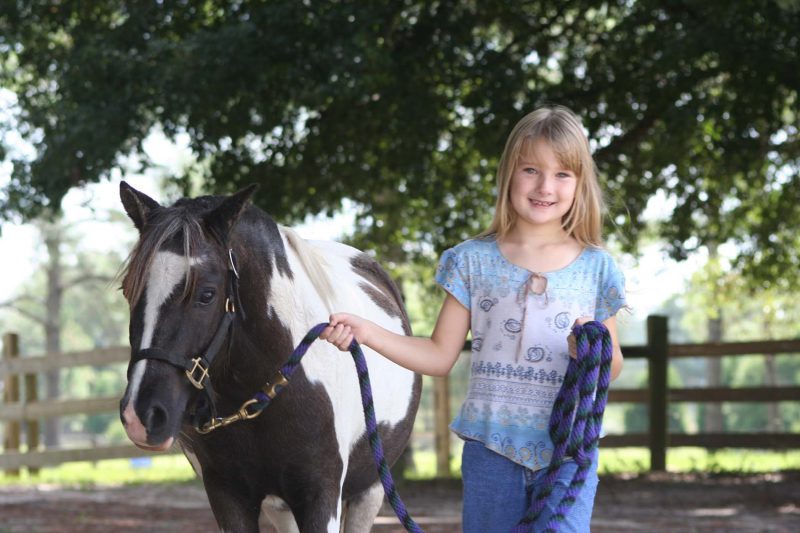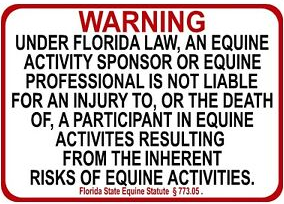
The Florida Equine Liability Act provides protection for horse farms, but it does not prevent lawsuits. Liability insurance is vital for protecting your assets against litigation. Credit: Summer Best, UF/IFAS
Saundra TenBroeck, UF/IFAS State Extension Horse Specialist
Running a horse operation or simply owning horses can bring potential risk associated with clients and/or guests on your property, particularly youth. Some courts have found that a child can find a horse to be an attractive nuisance (a dangerous condition on a landowner’s property that may particularly attract children onto the land and pose a risk to their safety). This can create a greater degree of responsibility on the owner to make sure individuals, including trespassers, do not get hurt by it on their land. As a businessperson and homeowner, it is important to consider purchase of liability Insurance. This will not prevent liability, but it can help save your assets.
=
Florida Equine Activity Liability Act (EALA):
Florida’s equine liability statute designates that an equine activity sponsor, an equine professional, or any other person shall not be liable for an injury to, or the death of, a participant resulting from the inherent risks of equine activities. F. S. A. § 773.01-02. Section 773.03 (2) provides 5 exceptions to the limitation on liability.
–
Limitation on liability for equine activity:
Nothing in s. 773.02 shall prevent or limit the liability of an equine activity sponsor, an equine professional, or any other person if the equine activity sponsor, equine professional, or person:
(a) Provided the equipment or tack and knew or should have known that the equipment or tack was faulty, and it was so faulty as to be totally or partially responsible for the injury.
(b) Provided the equine and failed to make reasonable and prudent efforts to determine the ability of the participant to engage safely in the equine activity, or to determine the ability of the participant to safely manage the particular equine based on the participant’s representation of his or her ability.
(c) Owns, leases, rents, has authorized use of, or is otherwise in lawful possession and control of the land or facilities upon which the participant was injured, and the injury was due totally or in part, to a dangerous latent condition which was known to the equine activity sponsor, equine professional, or person and failed to post warning signs.
(d) Commits an act or omission that a reasonably prudent person would not have done or omitted under the same or similar circumstances or that constitutes willful or wanton disregard for the safety of the participant, which act or omission was a proximate cause of the injury.
(e) Intentionally injures the participant.
Negligence: Negligence is conduct which falls below the standard established by law for the protection of others against unreasonable risk of harm. The legal standard of negligence would apply if the matter would not activate an Equine Activity Liability Act (EALA).
=
Avoiding Liability:
(a) Post and maintain one or more signs which contain the warning notice specified in in the statute. Place signs in a clearly visible location near to where the equine activity begins. The warning notice shall appear on the sign in black letters, with each letter to be a minimum of 1 inch in height, with sufficient color contrast to be clearly distinguishable.
(b) Give the participant a written document which the participant shall sign with the warning notice specified in the statute clearly printed on it.
- Establish a safety program to reduce the risk of injuries and liability
- Conduct equipment inspections: tack, fences, gates, stall doors, trailers, etc.
- Train your workers. Have safety manuals. Provide protective equipment.
- Establish barn rules
- Place signs where dangerous, non-obvious conditions exist
Examples: Two-person rule, No open-toed shoes, Wear protective headgear, No dogs
- A parent or adult must be present with all children under the age of 18 at all times, while in the barn or around the horses.
- Match the rider’s abilities with the horse he or she rides.
- Keep barn clean and put things away.
- Use liability releases (waivers) appropriately.
-
- Have child and both parents sign.
- Maintain the waiver for three years after a child’s 18th birthday
- State that the signers waive any legal rights to bring a lawsuit for inherent risk
- State that horse activities are dangerous and could cause serious harm or death
- Bold the most significant wording
- Make the waiver clear and easy to read
- Consider incorporating – This can also help save assets. This means you will have to file annual reports, use separate bank accounts, and separate bookkeeping
- Nicole’s Law: “Any child younger than 16 years of age must wear a helmet that meets current applicable standards of the American Society of Testing and Materials for protective headgear used in horseback riding and that is properly fitted and fastened securely upon the child’s head by a strap when the child is riding an equine.” https://flsenate.gov/Laws/Statutes/2021/0773.06
=
What If Something Happens?
- File an incident report
- Get accurate details: who, what, when, where?
- Document physical complaints
- Get injured party’s statement
- Get signature of injured party
- Get signatures from witnesses
- EVIDENCE!!!! Take pictures, get information from others involved, Communicate with your insurance provider
- Seek legal council from an attorney licensed in Florida, if necessary
–
NOT LEGAL ADVICE: This resource has been prepared for general information purposes only. The information presented here is not legal advice. Legal advice is dependent upon the specific circumstances of each situation. The information in this resource cannot replace the advice of competent legal counsel licensed in Florida.
=
Statutes & Constitution : View Statutes : Online Sunshine (state.fl.us)
https://horses.extension.org/equine-law-the-stories-of-what-horse-owners-need-to-know/
https://www.equinelawblog.com/author,Julie-Fershtman-Attorney
Equine Business Resources – Insurance for Equine Businesses – Extension Horses
http://www.equineexperiential.com/FloridaStatute.htm
- End of Life Issues – Euthanasia:A Horse Owner’s Final Act of Care - October 4, 2024
- Economic Impact Study Indicates the Florida Equine Industry Remains Strong - April 12, 2024
- Management Strategies to Prevent Seasonal Impaction Colic in Horses - October 27, 2023

